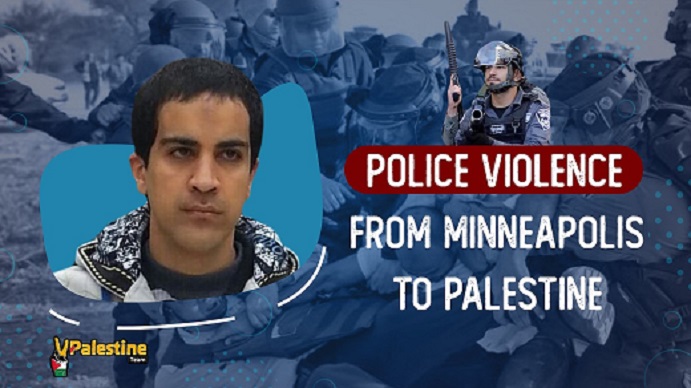Mohammad Kadan
Middle East Eye / June 2, 2020
Hundreds gather in Tel Aviv, Haifa and East Jerusalem for a third day following fatal police shooting of Eyad al-Halak.
Protests have flared across the occupied Palestinian territories for a third night after Israeli police shot and killed an unarmed autistic 32-year-old Palestinian.
Hundreds of protesters gathered on Tuesday in Tel Aviv, Haifa and occupied East Jerusalem, among other smaller cities, following the fatal shooting of Eyad al-Halak just outside his special needs school in occupied East Jerusalem’s Old City on Saturday.
“Palestinian live matter!” demonstrators chanted at many of the protests, playing off the “Black lives matter” movement, which grew out of massive protests for equal rights in the US after a Black teenager was shot dead by a white police officer in 2014.
Israeli forces killed Halak after claiming he was armed, shooting him several times with an M-16 as he was trying to run away.
Halak’s teacher told Israel’s Chanel 13 news on Sunday that she had tried to warn police, shouting “He’s disabled! He’s disabled!” at officers before they proceeded to gun him down.
‘Police brutality’
The incident sparked outrage, which has been heightened by the Black Lives Matter protests that have gripped the United States for the past week following the death of George Floyd, a 46-year-old unarmed Black man who was killed when a white police officer knelt on his neck for nine minutes.
All four officers who were at the scene have been fired, with one arrested and charged with third-degree murder.
In Haifa, hundreds gathered in protest, holding signs with messages such as “Justice for Eyad, Justice for George,” as well as “Black Lives Matter.”
Amir Marshi, a Palestinian student and activist, told Middle East Eye that protesters naturally drew comparisons between the two deaths, as they are both seen as racially charged police killings that have revived complaints of excessive force in both countries.
“Police brutality by the United States and the Israeli government are underlined by the same colonial supremacists logic that criminalises the historically oppressed and dispossessed,” Marshi said.
During the protests in Haifa, demonstrators also held up signs of other unarmed Palestinians who have been shot dead by Israeli forces, such as Razan al-Najjar, a 21-year-old Palestinian paramedic who Israeli forces shot dead during a Great March of Return protest in Gaza in 2018.
“We have to stand against these systems of oppression in all their incarnations and locations in solidarity and together,” Marshi told MEE.
‘Extrajudicial executions’
In 2019, Israeli forces killed at least 132 Palestinians in the occupied West Bank and Gaza, compared to 296 in 2018, according to the UN’s Office for the Coordination of Humanitarian Affairs (OCHA).
Human rights groups such as Amnesty International have continuously criticised Israel for what they call its use of “excessive force” and its practice of “extrajudicial executions“.
Protests often erupt in the occupied West Bank and Gaza over the killings of Palestinians, but it is less common for such protests to take place in Israel.
Still, more than 200 demonstrators gathered outside the US diplomatic mission in Tel Aviv on Tuesday, with activists expressing outrage in the names of both Eyad and Floyd.
Israel’s defence minister, Benny Gantz, who will become the country’s Prime Minister next year, on Sunday apologised for the fatal shooting, promising a swift investigation.
“We are really sorry about the incident in which Eyad Halak was shot to death and we share in the family’s grief,” Gantz said during a weekly meeting of the Israeli cabinet.
Prime Minister Benjamin Netanyahu, also at the meeting, made no mention of the incident.
Another Palestinian, Fadi Adnan Qaad, was shot dead by Israeli soldiers on Friday while he was driving his car in the occupied West Bank. The Israeli army said the driver accelerated in the direction of a number of soldiers and hit their bench, but they managed to get out of the way.
Qaad’s family denied he attempted to carry out an attack and said he was on his way to pick up his wife and children.
Last week, Netanyahu again confirmed his plan to annex parts of the West Bank, according to the Israeli media.
Tensions have flared in recent weeks as a result of the annexation announcement, with the Palestinian Authority halting all agreements and understandings with Israel and the United States, including security coordination.
Arab states, the United Nations and European countries have warned against the Israeli move, which would annex the land Palestinians seek for a state.
Mohamad Kadan is a writer and journalist













